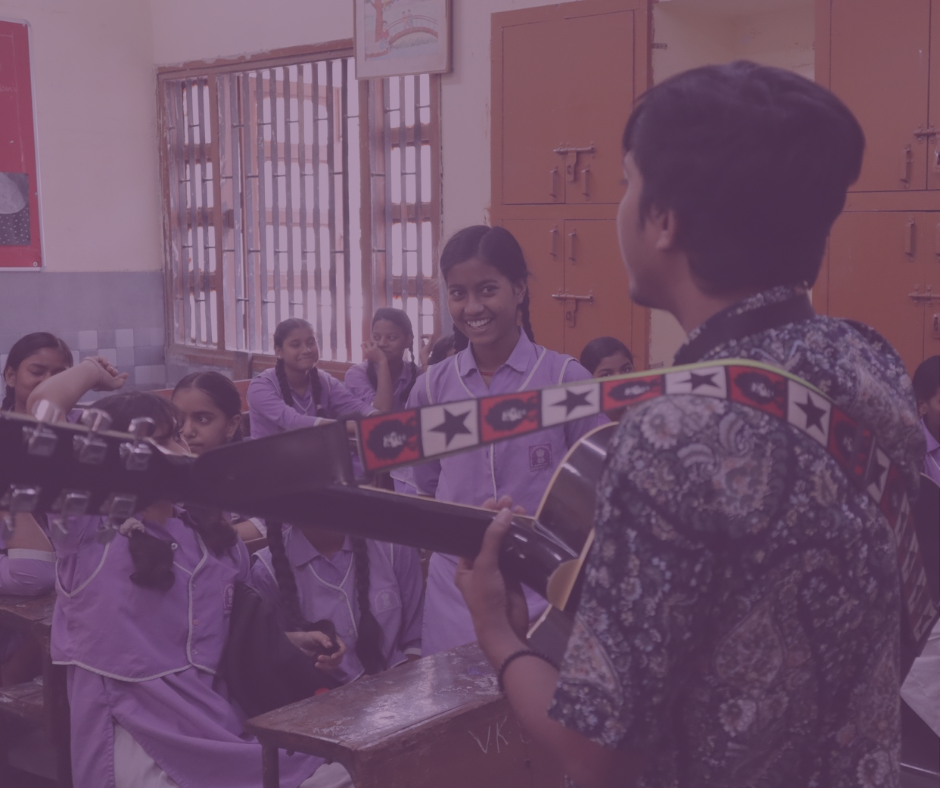Learning typically means education that is provided in schools. I am a first-generation graduate in my family. I studied to obtain and secure a job. The core role of education in enabling self-love, care, expression, being a good citizen, and having a dream wasn’t available to me. As I couldn’t achieve the required marks to gain admission into colleges, I used to roam aimlessly until a friend introduced me to Manzil, an organisation running after-school programmes for children from low-income communities. I started learning and practicing music here. Within a year, we created a band that continues to sing the ideas of Kabir.
During this time, I went to the United States on a full scholarship to study marketing and sales. When I came back to India in August 2012, my commitment to making music accessible to all children increased. There were 4.4 million children studying in Delhi who had no exposure to music education. Thus, Manzil Mystics Foundation was born with a one-hour weekly music class in government schools. Our first challenge was to convey to the schools and partners what music can bring to a child’s life. Students do not pursue music as a subject because it is associated with only singing and playing an instrument. The real consciousness to understand what a child can learn through music and what opportunities are available in the music field is largely missing in society. Since childhood, we have been using music, songs, and poems to learn tables, life lessons and to pray. Teaching different subjects using music can be revolutionary.
At Manzil Mystics, we teach important life skills through interactive music-based activities where children compose and sing songs. While writing a song, we use critical and creative thinking. While singing, we use self-discipline and confidence. When we perform in a group, we use team work and leadership, while music also helps convey thoughts and feelings without any fear of judgment.
Music has the potential to bring community-level change. In 2018, the Aga Khan Foundation called us to conduct a workshop on a pressing issue of toilets and hygiene in the Nizamuddin community in Delhi. To create awareness, we gathered 25 children and interacted with them for one hour a day for seven days. We conducted the sessions based on our four pillars: Satsang, where we sing a meaningful song with the group, Samvaad where we conduct a creative dialogue that deepens the connection among all the participants. Based on this dialogue, we create an original song (Sangeet). In Swadhyay, we reflect on the song that is created and teach children how to sing it. Our discussions told us about the challenge of toilets in the area and why people didn’t prefer using the existing toilets. We converted these insights into a song:
Tute nal hai, balti gayab or hai nali jaam,
(Taps are broken, the bucket is missing and the drain is clogged)
chori kar le gaya koi or kaam tamaam,
(someone stole the bucket, and all is gone)
signage leke ud gaya koi kaise ham na jaane,
(the sign is taken; we don’t know how)
khabar nahin hai humko koi ham kaise anjane,
(we are unaware of how this happened)
ek din toilet kho jayega or hojayega kam tamam
(one day, the toilet will be gone, and all will be done)
We performed the song in different communities of Nizamuddin and noticed a behavioural change in use and maintenance of public toilets and an increased care for personal hygiene in the community.
The government’s policy, Kishori Manch Yojana, aims to create awareness among adolescent girls on the topic of reproductive health and hygiene. We wrote a song that depicts the reproduction system and menstrual process through a musical animation. It was performed at Satsang in 15 Department of Education schools in Delhi. After the song, we discussed menstrual health and hygiene. During a discussion on whether period blood was clean or dirty, the facilitators and the students/teachers disagreed. The latter believed the blood to be impure and refused to listen. The facilitators wrapped the discussion with a song. This changed the group dynamics and the participants showed willingness to attend another session to understand and learn what the facilitators wanted to share.
There are so many young people who have changed their lives through music and are now increasing the accessibility, sustainability and usability of music. Students who had enrolled in the after-school classes in Manzil Mystics are now working in the social development sector. Anjali, along with Prakash and Himanshu, students of Manzil Mystics, are working as coordinators to create happy, safe and inclusive spaces for children using music. Neha is making spaces and opportunities accessible for blind women. Parul is creating livelihood opportunities for single mothers, while other students are working on creating music and songs to catalyse change in their communities.
Music not only helped me, but also helped my family become happier. Elders never allowed me to pursue music as a profession, but now proudly teach my son different songs and promote the work of Manzil Mystics. They realise that when you learn music, you not only become successful but also become a good human. Every child is creative, smart, confident and has a mind of their own. What is lacking are happy, safe and inclusive spaces where they can express and explore themselves without hindrance. No musical training or proficiency is required to create such learner-friendly spaces.
About the Author:
Anurag Hoon is the CEO and President of Manzil Mystics, which is working to transform lives by enabling access and use of Music to trigger creativity, learning and social change in low-income groups.


